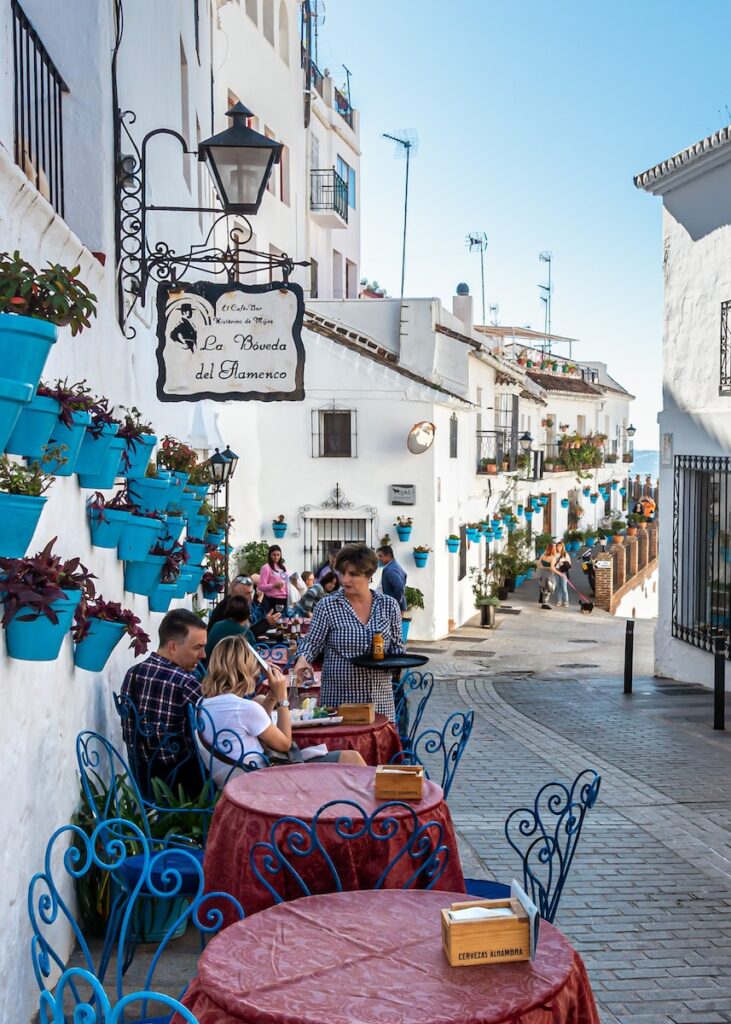Joining the Expats in Spain: Paella, Places, Perks, and Everything You Need to Know
Coming up in this guide: insider tips, potential new homes, help on finding friends, a wide range of visas, and everything you need to know about joining the expats in Spain.
Presumably (since you’re reading this), you’re thinking about moving to Spain. Maybe for the year-round sunshine. Maybe for the snooze-packed siestas. Or the digital nomad visa. The food. The friendly people. The relatively easy-to-learn language. The reasonable cost of living. Or maybe it’s loads of those factors rolled into one appealing combo.
Whatever the reason, Spain is a hugely popular relocation choice—more than 6 million non-natives live in the country, and it’s home to people from around the planet.
So in this guide, we’ve brought you everything you need to know about joining the expats in Spain. Expect useful info on visas, cities, weather, apps, food, expat communities, and plenty more. Vamos!
1. Pros of Joining the Expats in Spain
Some of the perks and pros of becoming an expat in Spain include:
- Many residency options: if you’re from another EU country, you can move to Spain with little fuss… and basically no bureaucracy. But if you’re not, you have lots of options, including the Golden Visa, the new digital nomad visa (more on that later), and the so-called non-lucrative retirement visa.
- Some of the best healthcare in the world: Spain ranked 21st in the 2022 World Index of Healthcare Innovation, and the nation has the highest life expectancy in all of Europe.
- Laid-back lifestyle: compared to many other places in Europe, life in Spain is a little more laid-back and laconic. The work-life balance is great, people like to rest and relax, and the whole nation has an unhurried atmosphere. If you like to take life at a slow pace, you’ll love living in Spain.
- Food! More on this later, but Spanish food is some of the best on the planet—you can enjoy a massive range of meals and morsels. In season, some fruits and vegetables can be highly affordable… and eating out can (sometimes) be surprisingly inexpensive.
- Good prices: we’re not gonna pretend Spain is a bargain-basement destination, but it’s a lot more affordable than some other western European nations. For high-earning expats in Spain, this is one of the biggest perks of relocating here.
- Some of the best nightlife in western Europe: there are around 170,000 nightlife venues in Spain, allegedly making it the biggest nightlife industry in Europe. And some night clubs stay open until 6am or 7am.
- A range of outdoor adventures. Spain (famously) has a lengthy coastline, measuring in at almost 8,000 kilometers (5,000 miles). But it also offers loads more landscapes, including deserts, volcanoes, lakes, canyons, mountains and more. If you join the expats in Spain, you can explore all this stuff on waymarked hiking trails, waymarked cycling trails, and world-famous pilgrimage routes.
- Loads of museums and galleries. Spain is home to around 1,500 museums, and loads more galleries. You’ll also find edgy independent arts venues in some of the bigger cities, along with theaters and arts festivals.
- Endless events: if you live in a big city, you’ll always find something to do. Combine a rich culture and history with fun people and good weather, and you get a packed calendar of events. Expect fairs, markets, tomato throwing, food festivals, historical reenactments, marathons, competitions, and plenty more.
Just for a bit of balance, Some cons of joining the expats in Spain can include low salaries, late nights (which early risers won’t like), sometimes-strange schedules, and the high demand for apartments in some of the well-known cities (we’re looking at you, Madrid and Barcelona)…
… but for most people, the pros of moving to Spain massively outweigh the cons.

2. Best Cities for Expats in Spain
If you’re joining the expats in Spain, you have plenty of options for where you might want to live. Some of the best (and most popular) choices are…
Barcelona
When you think of Spain, you probably think of Barcelona (and if you don’t, we’re not very good mind-readers—sorry).
Around 20% of Barcelona’s dwellers are from outside of Spain, making it easy to make friends and find a community here. Other perks of living in the city include welcoming year-round weather (average January temperatures sit at around 10°C/50°F), endless stuff to do (this is the most action-packed city in Spain, with loads of events every day), close proximity to both beaches and mountains, and some pretty good prices*.
*Note: for checking cost-of-living stats for Barcelona (or any other city!) Numbeo is your best friend. It’ll help you to work out where you can and can’t afford to live… and where you might be able to save some money.
The biggest problem with Barcelona is how popular it is—loads of people (just like you!) want to live here. Because of that, vacant apartments in Barcelona are snapped up quickly… and the leftover subpar ones can be both pricey and hard to get. For that reason, it’s usually easier to move into a serviced apartment or serviced flat, at least for a little while.
For more on the city, here are the 13 best neighborhoods in Barcelona, and our guide to being a digital nomad in Barcelona.
Madrid
The next-most-popular relocation option for expats in Spain, Madrid is surprisingly different to Barcelona. It’s a little more traditional, a little less touristy, and it has a lower population density of around 3x (so it feels much less busy and bustling).
Other pros of living in Madrid include a young population, some of the best nightlife in Spain, and a massive public transport system.
And although it’s a big city, it still feels very ‘real.’ Which, for better or worse, isn’t always the case in Barcelona.
And on top of all that, Madrid is located right in the very center of Spain; so you can reach many more parts of the nation from here. From Madrid, you’re never more than 6-7 hours (by car) from anywhere else in the nation. And for getting to other parts of the world, Madrid is also perfect—the city (unsurprisingly) is home to the busiest airport in Spain.
For more, check out our guides to being a digital nomad in Madrid, and the 10 best neighborhoods in Madrid.
Valencia
Most famous for food, many people reckon Valencia is Spain’s best city for munching on tasty treats. We’re not here to say who’s right or wrong, but paella hails from the place… which probably tells you everything you need to know.
Other draws of the city include a unique blend of modernity and tradition (it’s a hip and trendy city, but it’s home to lifelong locals and pockets of old-school charm), high levels of safety, a beachside location, and hyper-sunny summers. And it’s a lot more affordable than both Madrid and Barcelona.
For more, wander over to our guides on the 10 best neighborhoods in Valencia, and everything you need to know about being an expat in Valencia.
Seville
An under-the-radar choice for expats in Spain, southern Seville is even more traditional than Valencia. If you relocate here, you’ll feel like you’re living in ‘real’ Spain—expect tapas, flamenco dancing, and an unhurried pace of life.
Other big draws of living in Seville include Moorish architecture, affordable property, a walkable city center (yep, there’s great public transport here, but you might never need it), a small population of 700,000 people, close proximity to the hyper-famous Spanish south coast, and a reputation as the hottest city in the nation.
For more, get yourself over to our guide on the 10 best neighborhoods in Seville.
Malaga
Even further south than Seville, Malaga is another great option for warm weather: even in January, average temperatures here sit at around 12.5°C (55°F).
A resort-packed port city, it attracts lots of retirees and English speakers. So in some ways, it doesn’t feel as authentic as some other places we’ve listed. But the food is some of the best in Spain (expect lots of fishy flavors!), and it’s very easy to make friends here.
Other appealing aspects of living in Malaga include lots of events and cultural venues (there are around 40 museums here, and Malaga is where Pablo Picasso was from), a close-to-the-city-center airport, and excellent proximity to the rest of the Costa del Sol.
But for most people, the best part of living in Malaga is all the outdoor adventures. You’re close to endless beaches… and other easy-to-access excitement includes peaks, passes, hikes, hills, lagoons and lakes. If you like hiking or cycling, this is one of the best bases in Spain.
For more, here’s our guide to the 9 best neighborhoods in Malaga.
3. Navigating the Empadronamiento Process for Expats in Spain
The empadronamiento process isn’t as scary as expats expect it to be—and in about three minutes, you won’t be panicking about it anymore. Here’s everything you need to know:
The word ‘empadronamiento’ translates (from Spanish into English, obviously) as ‘census’…
… and getting your empadronamiento is basically just an official registration of your long-term arrival. If you’re gonna be in any Spanish city for 6 months or longer, you need to go through the empadronamiento process, to declare your presence in the city. Simple!
Everyone needs to do this. Spanish people, digital nomads, those from other parts of the EU, people who have visas—everyone! No matter which visas you already have, or which applications you’ve already made, you also need to additionally do your empadronamiento.
This process is a legal requirement. But it’s also a key building block for long-term life: you need proof of your empadronamiento (also known as your ‘padrón certificate’) to hire a car, register your child for school, buy a house, get a work permit, apply for other documents, and loads more. Without the empadronamiento, long-term life in Spain becomes impossible.
To get your empadronamiento, you need to make an appointment at your local town hall (known as ‘ayuntamiento’ in Spanish). Every town and village has one, and big cities usually have loads of them. So hop online, find your nearest one, and contact them to find an available slot.
You then arrive at your booked appointment with your documents (your passport, your application form, and proof of your current address). You chat to the member of staff, they ask you a few questions, and then you’re all done. You might get your certificate immediately, or you might get your certificate a few days later.
Note #1: for your in-person empadronamiento interview, you’ll be expected to speak Spanish, or provide your own Spanish translator (that’s also the case if you opt for a phone interview, instead of an in-person interview). If you don’t want to go through that hassle, you can instead apply for your empadronamiento online.
For much more information, here’s our guide to applying for your empadronamiento in Barcelona (though that guide is centered on Barcelona, pretty much all of its info applies nationwide).
Note #2: the website you’ll use to book your appointment (or fill out your online form) will differ depending on which city you’re in. The empadronamiento process is organized and managed regionally rather than internationally.

4. Finding Accommodation for Expats in Spain
For many expats in Spain, this is often the biggest struggle (or one of the biggest struggles) of moving to the nation. But you have loads of resources for finding a place to live:
- Furnished rental websites: A much-more-reliable option can be using a site offering serviced apartments and serviced flats (such as ours!). All of our homes are great for working and living, they’re all fully-furnished, and they’re all ready to move into today.
- Social media: one of the easiest options for expats in Spain, since basically everyone in the world has Facebook. Hop onto the site, go to the search bar, and look for ‘housing in [city name]’ or ‘apartments in [city name]’ for whichever place you’ll be living in. Telegram might also be useful, but Facebook is the best option by far.
- Real estate websites: the two most popular are Idealista and Fotocasa. Pisocompartido is a good option if you want a room in a houseshare.
- Local connections: this probably isn’t an option for you for now. But once you have friends and contacts in the city, they can help you find a place to live.
- Real estate brokers: you can ask real estate agents to help you find a place to live. They’ll find lots of options on your behalf… but they probably won’t listen to your specific needs, and they’ll charge you one month of rent (+VAT) for their services.
5. Understanding Spain’s Digital Nomad Visa
Spain’s digital nomad visa makes it even easier to join the expats in Spain.
Here’s how it works:
The visa is available to any non-EU/non-EEA citizens who make (and can prove they make) at least €2,160 per month. If you successfully apply, you’re given access to Spain for 12 months, and can extend for up to 5 years. Applicants also need a clean criminal record, proof of health insurance, and proof you’re a remote worker (with permission from your client(s) to work remotely).
You don’t need to be a solo traveler to apply—you can also move with a partner and/or kids. But if that’s the case, the income brackets change a little.

6. Weather in Spain
For expats in Spain, one of the biggest perks of moving to the nation is… of course… all the sunny weather.
But it’s a bit more complex than just ‘loads of sun all the time.’ So, broadly speaking, here’s what you can expect from Spain’s annual weather:
- Summers serve up high temperatures and dry days. Daytime temperatures usually sit above 30°C (86°F) for pretty much the entire season, but some pockets of the north can occasionally be a little cooler.
- Winters usually aren’t snowy (apart from in some of the most mountainous regions). But this is Spain’s rainiest period—and the more north you go, the more rain you’ll get. Barcelona, for example, gets around 640 mm of rain (and 55 days of rain) per year. Even in the heart of winter, temperatures still aren’t too cold—during Madrid’s January, for example, you get average temperatures of around 6°C (43°F).
- … both fall and spring, overall, are the most pleasant times to be in Spain. You get adventure-allowing temperatures (rather than the soaring heat of summer), along with sometimes-cool mornings and evenings. Spring has occasional flurries of intense rain, while fall can have occasional storms.
But, of course, different parts of Spain have different weather patterns and quirks…
… and to give you a few examples… northern San Sebastián is the rainiest city in Spain (receiving more than twice Madrid’s annual average rainfall). Some of the south coast can be super-windy. Seville is the hottest city in the nation (with average August highs of 36°C/97°F, compared to Madrid’s average August highs of 31°C/88°F). Ávila, close to Madrid, is the snowiest city in Spain, with around 20 snow days per year.
So, in short, here’s the point we’re making: you should check the specific weather patterns for whatever city or region you’re planning to move to. Cos weather can differ pretty widely across various parts of the nation.
7. Getting Around: The Best Local Apps for Expats in Spain
There are loads of handy apps for making relocating to Spain much more simple and stress-free…
… so here are some the ones we recommend:
- Navigation and transportation: both CityMapper and good ol’ Google Maps are brilliant options for getting around. Most Spanish cities have their own apps for checking real-time public transport, and/or buying public transport tickets. For Madrid, use Metro. For Barcelona, use TMB. For finding places to eat, drink and explore (wherever you are in Spain), we recommend Triposo. For riding taxis, Uber works, but Cabify is better.
- Food delivery: if you’re being all lazy, and don’t want to eat out or head to a restaurant, you can (of course) order some food to your door. For doing exactly that, your best options are Just Eat, Uber Eats, and Glovo. For something similar, check out Too Good To Go—although this app only works in bigger cities, it gives you massive discounts for picking up soon-to-be-expired food from cafes and restaurants.
- Language learning and translation: for learning the Spanish basics (yep, you should learn some Spanish to live in Spain), the best option is Duolingo. Other good language-learning choices include Babbel and Rosetta Stone. For translation, the Google Translate app is your best option, while Lingoda and Preply give you actual face-to-face online lessons with real human beings.
- Other good apps for living in Spain include Wise (an online bank with unbeatable conversion fees), N26 (a free easy-to-use online bank), Skyscanner (for finding cheap flights in the nation and beyond), Lime (if you want to ride scooters around the nation’s major cities), and both Komoot and Maps.me (for finding and planning hikes, bike rides and other adventures).
8. Joining Expat Communities in Spain
Expats in Spain (and expats anywhere!) often fret about making friends, thinking it’ll be one of the biggest challenges of moving to a new country.
But that’s not true. It’s easy to make friends if you know how.
The best place to start is always Facebook. Go to the search bar, and type a bunch of different variations on whatever place you’re moving to, such as ‘foreigners in [place name],’ ‘events in [place name],’ ‘digital nomads in [place name],’ and ‘expats in [place name].’
So, if you’re moving to Barcelona, for example, and do exactly what we’ve suggested above, you’ll find groups like this one, this one, and this one.
After using the above method, you’ll be able to attend events, attend meetups, join hobby groups, meet up with other expats 1-on-1, etc etc. And once you’ve made friends via those methods, you’ll then meet their friends, and their friends, and so on. And before you know it, you’ll have more friends than you ever thought you would. Easy!
Other good resources include Couchsurfing (this site isn’t just for finding free accommodation; it’s also good for meeting locals, meeting foreigners, and finding friends and events), Internations (an excellent online network for meeting up with other expats), and language-learning groups and events (most big cities host these types of events every week—you can find them on social media).
9. Munching on Spanish Delicacies: Must-Try Foods
One of the most food-tastic places on the planet, we can’t list all the best Spanish eats and treats here. But we still wanna give you a saliva-inducing intro… so some of the nation’s best foods include:
- Paella: a big ricey taste-fest, this is one of the most famous dishes on the planet… and there are a surprising number of regional variations across several parts of Spain.
- Meats and cheese: you’ll find endless varieties of cured meat and tasty cheese. Some of the biggest must-trys include jamón serrano, jamón ibérico, chorizo, salchichón, manchego and tetilla.
- Patatas bravas: tasty fried potatoes, with a load of regional varieties (and loads of regional sauces to go with them, depending on where you munch on the stuff).
- Tapas! Sit down, order a bunch of different mini plates, and chow down on them all. Tapas is (obviously) the best way to try many different Spanish tastes.
- Seafood: with a massive coastline comes a massive variety of sea-based dishes and delicacies. Expect squid, scallops, mussels, black risotto, anchovies, clams, codfish, eels, prawns, and plenty more. Spain is one of Europe’s best destinations for seafood.
- Wine: you know cava, rioja and sangria. But there’s also way more… Spain is one of Europe’s best countries for slurping and sipping on tasty and affordable wines.
- Sweets and desserts: some of Spain’s sugar-stuffed highlights include crema catalana (sort of like crème brûlée), rice with milk (much tastier than it sounds!), churros (fried dough, often dipped in chocolate), and the eggy sweetness of caramel-covered flan.
And here’s one final tip: wherever you go in Spain, make sure you ask locals about the best regional dishes. You’ll be surprised by how much variety there is… and locals love introducing foreigners to all their specialities.
Expats in Spain: Final Thoughts
Alright, that’s everything you need to know about joining the expats in Spain!
For better weather, a better quality of life, and relatively affordable prices, Spain is one of Europe’s best relocation destinations. And thanks to all the varied visa options, moving here is often pretty easy…
… but as we’ve mentioned, finding quality accommodation can be one of the biggest moving-to-Spain struggles (especially when you haven’t yet arrived in the nation). But we have loads of serviced apartments and serviced flats on our site—they’re all convenient and comfortable, they cut out all the stress and fuss, and they’re ready to move into today. Simple!
For more on moving to Spain, check out our guides on how to retire in Spain, everything you need to know about moving to Spain after Brexit, and blending work and leisure in Mallorca.
Thanks for reading, thanks for choosing Homelike, and we’ll see you in Spain. Adios amigos!






















